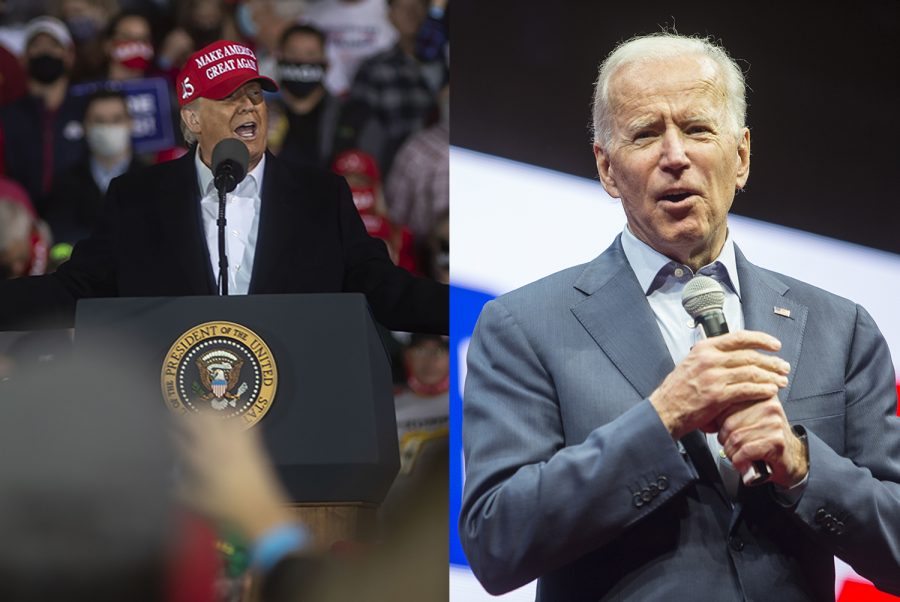Nation holds its breath
Iowa went for Trump on election night, but early Nov. 4 the country didn’t know the next U.S. president.
President Donald Trump and former Vice President Joe Biden.
November 4, 2020
DES MOINES — Many states did not report full results from the presidential election as of early morning Wednesday, and the forecast quickly became clear that a winner may not be known for several days.
President Donald Trump picked up the state of Iowa, which was called by the Associated Press at 11:21 p.m. He won 53 percent of Iowa’s vote, while Democrat Joe Biden won 45 percent, with 99 percent of precincts reporting.
“Tonight we have proven without a doubt that Iowa is a red state,” Iowa Gov. Kim Reynolds said at the state’s GOP watch party in Des Moines. “I’ve said all along that you were going to get the results that you’re seeing tonight because everywhere we went we saw energy, excitement, enthusiasm, momentum.”
As of 12:30 a.m. Wednesday, Trump had 213 electoral votes to Biden’s 224, and many states still have to count absentee ballots. Trump won several key swing states, including Florida, Ohio, and Texas. Biden won Minnesota and had the upper hand in Arizona, with 78 percent of votes counted.
The race will likely come down to a few key Midwestern states which didn’t report full results on election night. Votes in Pennsylvania, Michigan, and Wisconsin were too close to call, with Trump taking an early lead but hundreds of thousands of votes still not counted. For example, in Wisconsin, almost 3 million votes have been reported as of 12:40 p.m. This is only 78 percent of total votes in the state.
In those states, mail-in ballots could not be opened until Tuesday, and Michigan’s Secretary of State said she doesn’t expect to have full results until Friday. Polling indicates that absentee ballots favor Biden.
The coronavirus pandemic dominated the 2020 election, becoming a focal point of both candidates’ messaging and leading more people than ever to cast their ballots early.
Trump placed major stock in a speedy development of a vaccine against the virus, often ignoring the advice of public-health experts and insisting that his presidency would bring quick economic recovery. Biden’s message in the closing days —including in a stop in Iowa — zeroed in on the Trump administration’s response to the coronavirus pandemic, saying the president had given up on fighting the virus, and placing the blame for the more than 230,000 American deaths from COVID-19 on the president’s shoulders.
Both candidates pounded these messages in swings through Iowa ahead of Election Day.
The pandemic also led to a surge in early voting — both in person and by mail — and more than 100 million Americans had already voted by Tuesday, according to the U.S. Elections Project. The record-breaking numbers slowed the vote count in some states.
From Wilmington, Delaware, Biden said around 11:40 p.m. that he thought he was on track to win the election, and that the results would take some time to be fully documented.
“We knew because of the unprecedented early vote and mail-in vote that it was gonna take a while, that we’re going to have to be patient until the hard work of tallying the votes is finished,” Biden said. “And it ain’t over till every vote is counted, every ballot is counted.”
Trump did not make a public appearance by 12:30 Wednesday morning.
On Sunday, Trump criticized the U.S. Supreme Court for deciding not to review a decision from the Pennsylvania Supreme Court that allows ballots to be accepted after Election Day. Republicans in several states have been challenging voting laws that extend the deadline to accept ballots or expand voting access.
“We’re going to go in the night of, as soon as that election is over, we’re going in with our lawyers,” Trump told reporters about Pennsylvania at a campaign stop on Sunday.
The focus throughout the night moved from the South to the upper midwest as Trump won several early states. Both candidates fought heavily for the upper hand in the midwest in the days leading up to the election.
Trump won handily in the rust belt in 2016, campaigning as an audacious anti-establishment candidate who would “drain the swamp” of Washington insiders.
Coralville resident Mark Shershen voted for the first time on Tuesday at age 61, casting his vote for Trump. He said he leaned Democratic for his whole life, but that he no longer agreed with the way the party was going.
“I was always Democratic,” he said at Coralville City Hall after he voted. “I felt Joe Biden, he’s had 40-plus years, he was vice president for eight years. I don’t think he got little to no accomplishments done, and I just didn’t like what he had to say in the debates in all.”
Aisha Myers, 42, was a Bernie Sanders supporter in the Iowa caucuses. She said she disapproved of how Trump handled the coronavirus, and that he was a threat to women’s and LGBTQ rights.
“Right now just for the safety of women, minorities, I’m voting for Biden and Kamala because the current administration has not been about all people and being inclusive,” she said. “It’s a very divisive time and it’s scary.”
Several people interviewed by The Daily Iowan said they weren’t expecting to see election results on Tuesday night.
“I think it’s premature to expect results tonight. We still have to wait for everyone’s votes to come in the mail. It would be great if it was, though,” said Kailyn Schafer, a University of Iowa student from West Des Moines.
Mary Hartel and Lillian Poulsen contributed to this report.















